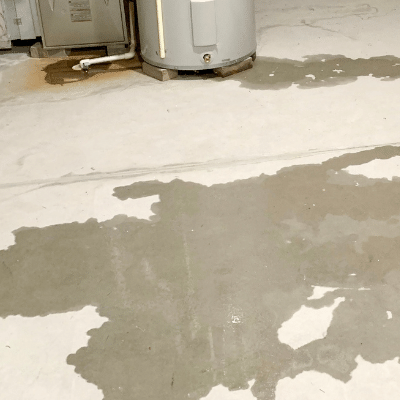If your basement stays dry most of the time but suddenly leaks every time it rains, you’re not alone. This is one of the most common basement waterproofing problems homeowners face. It’s also one of the most confusing — because if your foundation were truly “broken,” shouldn’t it leak all the time?
The truth is, rainwater adds pressure and changes how water moves around your home, and even a small vulnerability in your foundation or drainage system can let that water find its way in. Let’s look at the most common reasons your basement leaks during rainfall and what you can do about it.

1. Hydrostatic Pressure Builds Up When It Rains
The soil around your foundation absorbs water when it rains. As that soil becomes saturated, it expands and puts hydrostatic pressure against your foundation walls and floor.
Concrete is porous, and even the smallest crack or weak spot becomes a path of least resistance. That pressure can push water through:
- Hairline cracks in walls or floors
- Gaps around pipes or basement windows
- The cove joint (where the wall meets the floor)
This type of leak often looks like water seeping in slowly or forming small puddles after a storm.
2. Poor Grading and Drainage Direct Water Toward the House
Your yard’s slope and drainage system play a major role in keeping your basement dry. If the ground around your home slopes toward the foundation instead of away from it, rainwater naturally flows toward your basement walls and increases the pressure against them.
Other common drainage problems include:
- Clogged or disconnected gutters and downspouts
- Downspouts that discharge too close to the house
- Landscaping that traps water near the foundation
These issues are easy to overlook but can dramatically increase the amount of water your basement walls are forced to hold back during a rainstorm.
3. Cracks and Gaps Become Active Leak Points
Even a small foundation crack can stay dormant in dry weather. But when rain saturates the soil and raises the moisture level around your foundation, those cracks become active leak points.
Water follows the path of least resistance — so if there’s a gap in the concrete, even one too small to notice, water will find it. Over time, repeated exposure can make those cracks worse and lead to bigger leaks.
4. Your Sump Pump or Drain Tile System Isn’t Working Properly
If your home has a sump pump or drain tile system, it’s designed to collect and move groundwater away from your foundation. But if that system isn’t functioning correctly, water can back up and leak into your basement during heavy rain.
Common problems include:
- A failed or undersized sump pump
- Clogged drain tiles or discharge lines
- Power outages or pump malfunctions during storms
Testing your sump pump regularly and keeping the system maintained is key to preventing rain-related leaks.
5. Surface Water Finds Entry Points You Can’t See
Not all leaks start below ground. Rainwater from roof runoff, overflowing gutters, or misdirected downspouts can pool around basement windows, window wells, or stairwell doors. If seals around those openings are compromised, water can easily enter during storms.
How to Stop Basement Leaks from Rain
The first step is identifying where and how the water is entering. Once you know the source, professional waterproofing solutions can address the problem permanently. Depending on your situation, fixes may include:
- Interior or exterior drain tile installation
- Foundation crack repair and sealing
- Sump pump repair or replacement
- Grading and gutter improvements
- Window well drainage solutions
At Jerry’s Waterproofing, we specialize in diagnosing and solving rain-related basement leaks. Our team will inspect your foundation, identify the cause, and design a waterproofing solution that keeps your home dry — no matter how hard it rains.
Don’t wait for the next storm to reveal the problem again. Contact Jerry’s Waterproofing today for a professional basement waterproofing inspection and protect your home from costly water damage.



